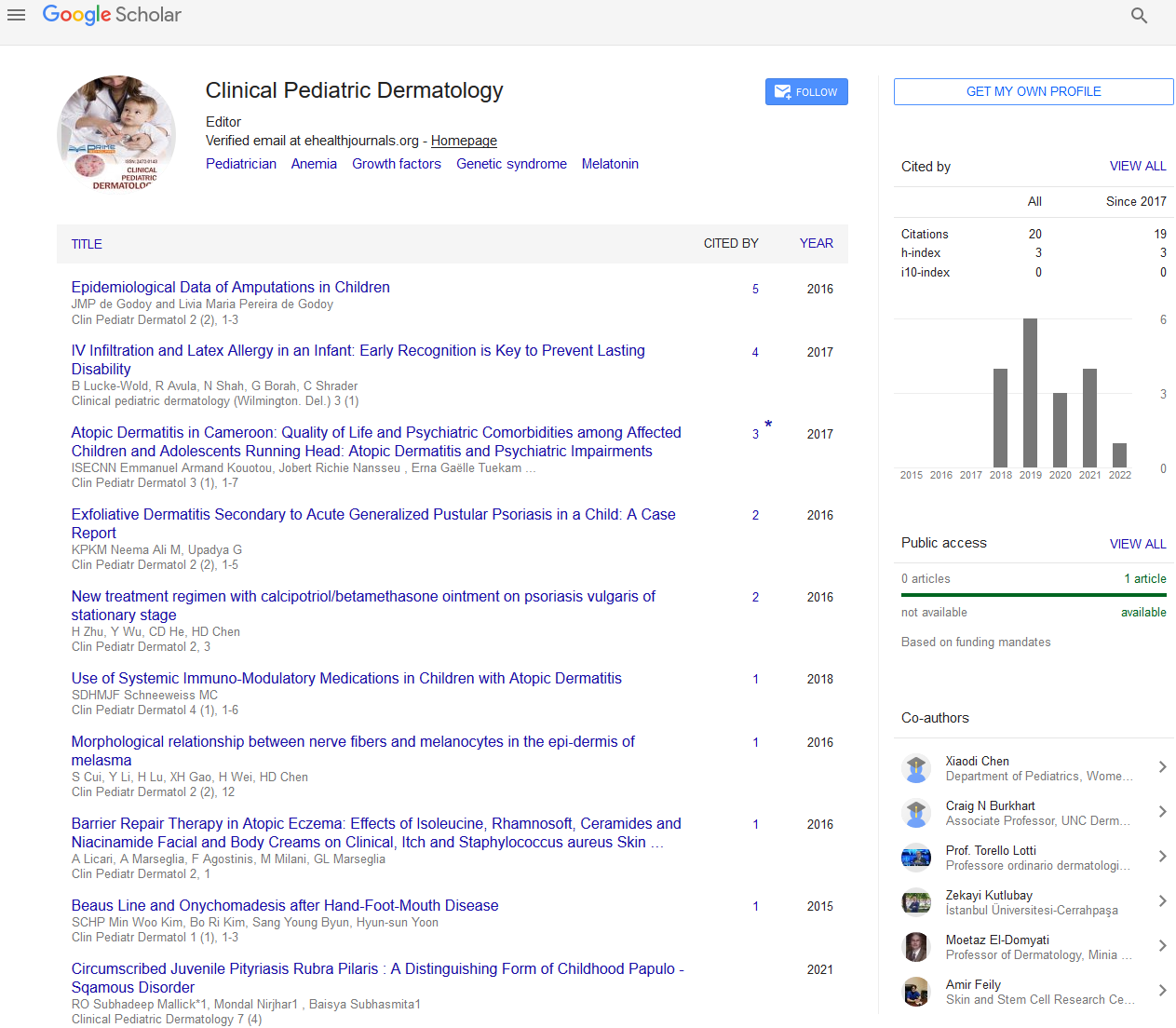Commentary - (2024) Volume 10, Issue 3
The Growing Concern of Pediatric Allergies: Urgency for Awareness and Comprehensive Care
Gratzer Daley*
Department of Pediatrics, University of Pennsylvania, USA
*Correspondence:
Gratzer Daley,
Department of Pediatrics, University of Pennsylvania,
USA,
Email:
Received: 02-Sep-0024, Manuscript No. ipcpdr-24-21337;
Editor assigned: 04-Sep-2024, Pre QC No. ipcpdr-24-21337 (PQ);
Reviewed: 18-Sep-2024, QC No. ipcpdr-24-21337 ;
Revised: 23-Sep-2024, Manuscript No. ipcpdr-24-21337 (R);
Published:
30-Sep-2024, DOI: 10.36648/2472-0143.10.3.30
Description
Pediatric allergies have emerged as a significant public health
concern, affecting millions of children worldwide. The rise in
allergic conditions such as food allergies, asthma, allergic rhinitis,
and atopic dermatitis poses a growing challenge for healthcare
providers, parents, and society at large. This commentary
explores the increasing prevalence of pediatric allergies, the
challenges in managing these conditions, and the urgent need for
heightened awareness, research, and a multidisciplinary approach
to care. Environmental factors, such as increased exposure to
pollutants and dietary changes, are also believed to play a role.
Genetic predisposition further contributes to the likelihood
of developing allergic conditions, especially in children with a
family history of allergies. Managing pediatric allergies presents
several challenges for both healthcare providers and families.
One of the primary challenges is the accurate diagnosis of allergic
conditions. Symptoms of allergies often overlap with other
common childhood illnesses, leading to misdiagnosis or delayed
diagnosis. For example, asthma symptoms such as wheezing and
coughing can be mistaken for respiratory infections, while atopic
dermatitis might be confused with other skin conditions. Accurate
diagnosis is crucial for effective management and prevention of
severe allergic reactions. Another significant challenge is the
management of food allergies, which require constant vigilance
to avoid exposure to allergens. This can be particularly difficult
in settings such as schools, day-care centers, and public spaces,
where children may accidentally come into contact with allergens.
The fear of anaphylaxis, a life-threatening allergic reaction, adds
to the anxiety for parents and caregivers. Moreover, the social and
psychological impact of food allergies on children can be profound,
leading to feelings of isolation, anxiety, and reduced quality of life.
Addressing the growing concern of pediatric allergies requires a
multidisciplinary approach that involves healthcare providers,
educators, policymakers, and the community. First and foremost,
there is a need for increased awareness and education about
pediatric allergies. Parents, teachers, and caregivers should be
educated about the signs and symptoms of allergic reactions, the
importance of early diagnosis, and the steps to prevent and manage
allergic conditions. Public health campaigns can play a vital role in
disseminating this information and reducing the stigma associated
with allergies. In the clinical setting, a comprehensive approach
to care is essential. This includes early and accurate diagnosis
through appropriate allergy testing, personalized management
plans, and regular follow-up to monitor the child’s condition.
For children with food allergies, developing an emergency action
plan, including the use of epinephrine auto-injectors, is crucial
to managing potential anaphylactic reactions. Collaboration
between pediatricians, allergists, nutritionists, and mental health
professionals can provide holistic care that addresses both the
physical and emotional needs of the child. Research is also vital in
advancing our understanding of pediatric allergies and developing
new treatments and preventive strategies. This includes exploring
the role of early-life exposures, dietary interventions, and
immunotherapy in preventing and managing allergic diseases.
Increased funding and support for allergy research are essential to
uncovering the underlying mechanisms of allergies and translating
these findings into effective interventions. Pediatric allergies
represent a growing public health challenge that demands urgent
attention and action. By increasing awareness, improving access
to specialized care, and adopting a multidisciplinary approach,
we can better manage pediatric allergies and improve the quality
of life for affected children and their families. As the prevalence
of allergic conditions continues to rise, it is imperative that we
prioritize research, education, and comprehensive care to address
this critical issue effectively.
Acknowledgement
None.
Conflict Of Interest
The author’s declared that they have no conflict of interest.
Citation: Daley G (2024) The Growing Concern of Pediatric Allergies: Urgency for Awareness and Comprehensive Care. Clin Pediatr Dermatol. 10:30.
Copyright: © 2024 Daley G. This is an open-access article distributed under the terms of the Creative Commons Attribution License, which permits unrestricted use, distribution, and reproduction in any medium, provided the original author and source are credited.

